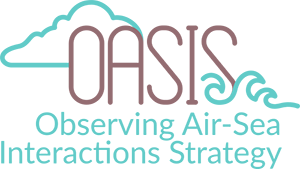
- Chair(s)
- Meghan Cronin (USA), Sebastiaan Swart (Sweden), Christa Marandino (Germany)
- Other Full Members
- Clarissa Anderson (USA), Phil Browne (UK), Shuangling Chen (China), Warren Joubert (South Africa), Nadia Pinardi (Italy), Ute Schuster (UK), R. Venkatesan (India)
- Associate Members
- Oscar Alves (Australia), Zhaohui Chen (China), Fabrice Ardhuin (France), Jim Edson (USA), Juliet Hermes (South Africa), Hiroyuki Tomita (Japan)
- Reporter
- Ilka Peeken
- Terms of Reference
Harmonize the recommendations from the OceanObs’19 CWPs into a unified Observing Air-Sea Interaction Strategy (OASIS) by identifying and ranking overlaps and resolving apparent contradictions, focusing on global air-sea exchanges of heat, moisture, momentum, important greenhouse gasses, biogenic trace gasses, and the multidisciplinary boundary layer variables associated with these air-sea exchanges.
Produce a capacity building strategy that enables developing nations (including least developed nations and island nations) to actively participate in and benefit from local-to-global air-sea interaction observations. This will involve a training strategy, as well as identification of opportunities for leveraging contributions by new partners.
Develop and assess network designs that optimize air-sea interaction observations, following the Framework for Ocean Observations, in coordination with OceanPredict, and other working groups focused on optimizing network design.
Develop a strategy for air-sea interaction process studies to address knowledge gaps; to improve model and satellite representation of Essential Ocean Variables (EOVs), Essential Climate Variables (ECVs), and Essential Biological Variables (EBVs) associated with air-sea interaction processes; and to develop parameterizations to relate variables that are difficult to measure with variables that can be broadly observed.
Develop a strategy for assessing interoperability of surface observing platforms. This will include intercomparisons of EOV, ECV, and EBVs observed from different platforms; development of best practices; and development of procedures to increase Technical Readiness Levels and expand technology solutions.
Build community and capacity for using, operating, and developing air-sea interaction observational platforms that allow collaborative partnerships with existing national and international air-sea interaction working groups and observational coordination groups.
- Approved
- October 2020
- Financial Sponsors
- SCOR, NSF
- Affiliated Organization
- UN Ocean Decade endrosed project
- Meetings
November 2020 (online)
December 2020 (online)
January 2021 (online)
February 2021 (online)
March 2021 (online)
April 2021 (online)
May 2021 (online)
June 2021 (online)
September 2021 (online)
October 2021 (online)
November 2021 (online)
December 2021 (online)
January 2022 (online)
February 2022 (online)
March 2022 (online)
April 2022 (online)
May 2022 (online)
June 2022 (online)
July 2022 (online)
August 2022 (online)
September 2022 (online)
October 2022 (online)
November 2022 (online)
December 2022 (online)
January 2023 (online)
February 2023 (online)
March 2023 (online)
April 2023 (online)
May 2023 (online)
June 2023 (online)
July 2023 (online)
February 2024 in New Orleans, USA
- Group Website
- https://airseaobs.org/
- Publications
- Cronin, M. F., Swart, S., Marandino, C. A., Anderson, C., Browne, P., Chen, S., et al. (2022). Developing an Observing Air–Sea Interactions Strategy (OASIS) for the global ocean. ICES Journal of Marine Science, fsac149. doi: 10.1093/icesjms/fsac149.